Hatchards, Piccadily
January 15, 2026, 6:30pm — 187 Piccadilly, London, UK
Pints of Knowledge
January 28, 2026, 6:00pm — Soho Comedy House, 30 Dean St, London, UK
Cambridge Literary Festival
April 25, 2026, 10:00am — Cambridge, UK
International Literature Festival Dublin
May 15–24, 2026 — Dublin, Ireland
Bradford Literature Festival
July 3-12, 2026 — Bradford, UK
Boston Book Festival
October 17, 2026 — Boston, MA
Iowa City Book Festival
October 19-25, 2026 — Iowa City, IA
Oxford Literary Festival
March 13-21, 2027 — Oxford, UK
The World in a Phrase
A Brief History of the Aphorism - Second Edition
Celebrating the short, witty, philosophical phrases known as aphorisms, this delightful history is an entertaining tour through the wisest and wittiest sayings in the world.
Aphorisms are literature’s hand luggage. Light and compact, they contain everything you need to get through a rough day at the office or a dark night of the soul. Aphorisms, the oldest written art form on the planet, have been going viral for thousands of years, delivering the short, sharp shock of old forgotten truths. Today, visual artists are mixing pithy language with compelling imagery and using social media to take the form into the future. In a world of disinformation and deepfakes, aphorisms point to the power of fresh debate over tired dogma and inconvenient truths over comfortable lies.
Starting in ancient China and ending with contemporary meme-makers and street artists, The World in A Phrase tells the story of the aphorism through brief biographies of some of its greatest practitioners, from the Buddha, Nietzsche, and George Eliot to James Baldwin, Audre Lorde and David Byrne. The World in A Phrase is for lovers of words and seekers of wisdom. This new edition of the New York Times bestseller features 26 additional aphorists and explores the aphorism in the age of social media, showing why these short sentences are the ultimate deep dives in an era when TL;DR has become a cultural catchphrase.
Read an excerpt from The Psychologist on how the Ukrainian government's official X account uses memes as aphorisms
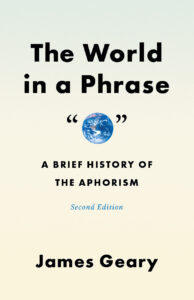
Order Now
Praise for The Second Edition
“An accessible and funny guide to millennia of aphorisms.”
– Karl Whitney, Irish Examiner
“A definitive—and delightful—handbook to the hard-to-define aphorism.”
– John Kelly, Mashed Radish
“A museum of humanity held in the palm of one's hand.”
– Lee Seong-bok, South Korean poet and aphorist
Praise for The Original Edition
“Geary fell in love with aphorisms when, at 8, his eye wandered to the Quotable Quotes section of Reader’s Digest ... His attraction turned into a lifetime obsession, which he indulges to the fullest in ‘The World in a Phrase’, his entertaining love letter to the compact form.”
– New York Times
“Probably the definitive work on aphorisms, a love letter-cum-memoir disguised as a reference book ... fellow fanatics will be delighted.”
– Publishers Weekly
“It is impossible not to be swept along with Geary’s enthusiasm. He has illuminated some poignant observations of the significance of introspection.”
– The Times Literary Supplement
“What a pleasant, personal, thoughtful little book ... Geary’s account is full of wonderful aphorisms .... Delightful.”
– Booklist
Events
Upcoming Appearances
January 15, 2026, 6:30pm, 187 Piccadilly, London, UK
January 28, 2026, 6:00pm, Soho Comedy House, 30 Dean St, London, UK
April 25, 2026, 10:00am, Cambridge, UK
International Literature Festival Dublin
May 15–24, 2026, Dublin, Ireland
July 3-12, 2026, Bradford, UK
October 17, 2026, Boston, MA
October 19-25, 2026, Iowa City, IA
March 13-21, 2027, Oxford, UK
2025 World in A Phrase Appearances
Video talk: Literature's Peak Experience: How Aphorisms Work
October 10, Fairfax, VA
International Aphorism Conference
October 24-25, Wroclaw, Poland
November 10, 7pm, 1256 Massachusetts Ave, Cambridge, MA
November 12, 10am, Charleston, SC
November 15, 3pm, 5015 Connecticut Avenue NW, Washington, DC
in collaboration with The Rabkin Foundation
November 18, 7pm, 519 Congress St., Portland, ME
November 21, 6pm, 1708 Chestnut St., Philadelphia, PA
Aphorisms by Charles R. Castle
February 26, 2026
After retiring from a career in healthcare and becoming “a rather late in life poet,” Charles R. Castle developed a fascination with aphorisms during the pandemic, a fascination fueled by W.S. Merwin’s translations in Asian Figures and his Voices of Antonio Porchia (see The World in a Phrase, pp 217-220). Charles included about 100 of his aphorisms as the final chapter of his poetry collection, On the Beach of Borrowed Time. “I’ve found my aphorisms to be an effective change of pace to add to a poetry reading,” Charles says. “The shorter book has also been a way for me to make a political response to current events. I sell or give them away at marches and street protests. We are living in historically interesting times. If nothing else, my great grandchildren will know I made some small effort to express my opposition to the insanity we are witnessing and perhaps I will encourage them to do the same in the future. Why else do we write?” Here is a selection of Charles’s “Aphorisms for an Absurd World”…
You can’t write the book of your life standing in the margins
The straw that broke the camel’s back was carried on the wind
The most precious gifts are rarely wrapped
Old ideas may kill us with new weapons
Judge us by how we treat the weak
not by how we arm the strong
What doesn’t kill you just needs more time
An eye for an eye and a tooth for a tooth
costs and arm and a leg
Less road rage on the road less traveled
Books
-
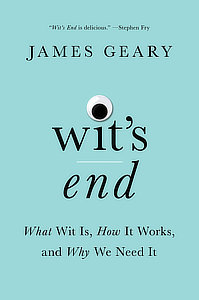
Wit's End
What Wit is, How it Works, and Why We Need It
Wit is often thought of as simply being funny. But wit is more than just having a knack for snappy comebacks. Wit is the quick, instinctive intelligence that allows us to think, say or do the right thing at the right time in the right place.
-
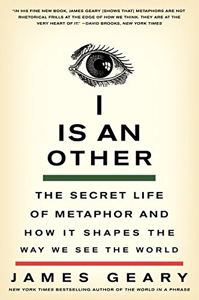
I Is an Other
The Secret Life of Metaphor and
How It Shapes the Way We See the WorldNew York Times bestselling author James Geary offers a fascinating look at metaphors and their influence in every aspect of our lives, from ordinary conversation and commercial messaging to news reports and political speeches.
-
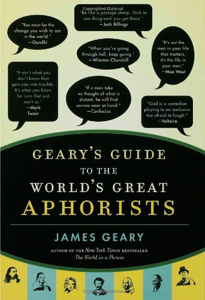
Geary's Guide to the
World's Great AphoristsGeary's Guide is the result of a lifetime's obsession with aphorisms and a year's death-defying research in the British Library. More than 350 authors from around the world, some of whom appear here in English for the first time, are brought together in this lively and thought-provoking compendium.
-
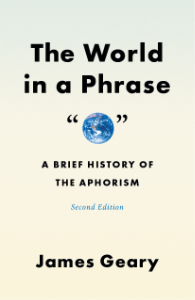
The World in a Phrase
A Brief History of the Aphorism - Second Edition
Celebrating the short, witty, philosophical phrases known as aphorisms, this delightful history is an entertaining tour through the wisest and wittiest sayings in the world. This new edition of the New York Times bestseller explores the aphorism in the age of social media, showing why these short sentences are the ultimate deep dives in an era when TL;DR has become a cultural catchphrase.
-
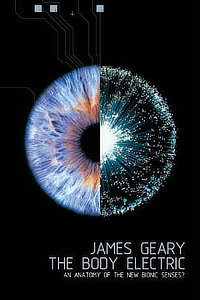
The Body Electric
An Anatomy Of The New Bionic Senses
Drawing on fields as diverse as artificial intelligence and neuroscience, The Body Electric provides an exciting synthesis of the people and technology making the convergence between biology and technology possible, while addressing the psychological, social and philosophical implications of these startling developments.


